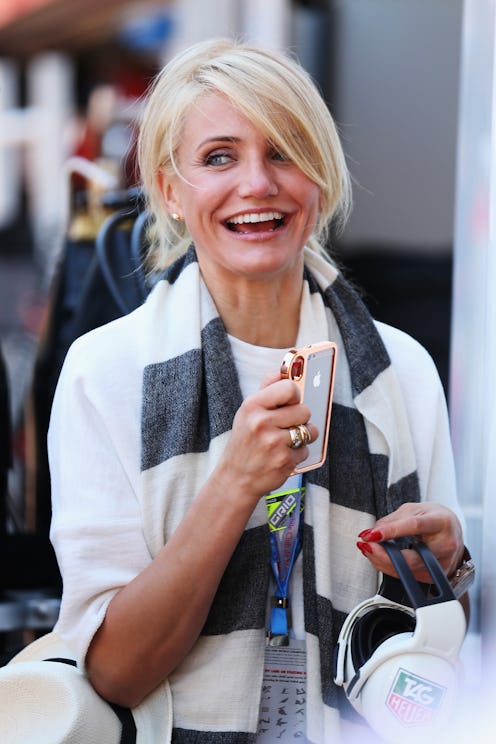Asking a celebrity to give fans advice is not an uncommon practice. Somewhere along the line, we, as a culture, decided that celebs needed to weigh in on more than just the art or industry for which they're famous and that's where it gets sticky. Take for example, the recent essay in Seventeen by actress Cameron Diaz, who uses her own journey as a teen to try to convince young people to shift their diets towards healthy eating.
At face value, Diaz's article is simple enough: a quick message from a famous health nut on the value of eating right. But the problem is that when you get to the actual content, it amounts to: I was unhealthy once and when I got healthy, I felt better. That's it. There's no emotional core, the writing is pandering to the Seventeen audience as if they're simpletons, which they're not, and as someone who grew up reading Seventeen, it's insulting.
Of course, that's not necessarily Seventeen's fault. They're simply trading in the currency we've built by putting celebrities on a pedestal: you're famous, so your word is golden. And while Diaz actually is a verified fitness fiend, so much so that she's written a book aptly titled The Body Book, she's not sharing much of her incredible knowledge here. Diaz does do a few things right by connecting health to feeling good and touching briefly on the "thin equals healthy" myth by explaining that "I would order a double cheeseburger with french fries and onion rings. I was the poster child for being both skinny and unhealthy." But for the most part, her writing simply stands on the merit that she's a celebrity, so we should listen to her.
And while being a celebrity does not automatically make you an improper ambassador for information — even politicians lean on celebrities to help spread the word about their causes and every person brings something different to the table — it only works when that actor, actress, or even reality star actually gives us some worthwhile information to go on. And Diaz's post, in addition to promoting the sale of her own book, helps promote Seventeen's Body Peace Treaty, a really easy and wonderful set of rules for body acceptance, health, and fitness. As a self-proclaimed expert on body love, Diaz should give readers something they can't get from anyone else, but she doesn't. Instead, she makes one of the hardest lifestyle changes for many people to make look like a cake walk.
If a teen magazine was to enlist one of the top registered dietitians in the nation to write about how eating affects your body, even when you're young enough that your metabolism keeps all those Doritos and Double Doubles off of your hips, that person would have to prove their worth by using the huge bank of knowledge they've built to deliver a piece that truly gave the reader something they could use. But when the nutrition expert is a celebrity, all that person has to do is stand up and say "nutrition is good, so do it. I know because I'm a famous actress and I look great on camera."
It's not only frustrating that Diaz's example of finding her nutrition empowerment is thin and written with a tone that puts the reader at arms' length, it's that she doesn't really explain that empowerment: the most important piece of the better body puzzle that Seventeen's aforementioned Body Peace Treaty aims to achieve. Per the magazine, health and nutrition is not about looking like the woman on the cover of their own magazine, it's about finding your best you:
Remind myself that what you see isn't always what you get on TV and in ads — it takes a lot of airbrushing, dieting, money, and work to look like that.
As well as:
Remember that even the girl who I'd swap bodies with in a minute has something about her looks that she hates.
Sure, these rules aren't revolutionary, but many of them combat the notion that celebrities' appearance and lifestyles are the goal. Diaz, like her fellow famous folks, has resources available to her that the average woman — let alone, average teenager — simply does not have: she has more time, money, and resources to devote to fitness than most of us.
If her essay was more heartfelt, it might make some sense as to why she needed to share it with young readers. But it reads like a bubbly Nike ad (just totally do it!). In a world where the ease with which famous people achieve their fitness goals with their seemingly infinite resources is constantly taunting us, seeing Diaz claim she just switched to vegetables and became the healthy, fit, sexy celebrity she is today perpetuates the idea that fitness is a quick process. And that idea is what continually makes many us miserable. It perpetuates the rampant issue of young women — actually, make that all women — constantly comparing themselves and their ability to accomplish their health and fitness goals to people who make money when they look amazing on a screen or stage.
Understandably, we live in a world where the word of a celeb goes further than say, the word of a young Seventeen writer or even readers who experienced something similar, but for my money, that writer or Seventeen reader's word would be more powerful. Reading about getting healthy from someone whose life we can actually relate to, instead of a woman who had already started a modeling career when she was sixteen, is far more relatable and useful, however "likeable" Diaz may be.
Because while it feels good sometimes to have a "stars, they're just like us" moment, when it comes to your body and your health, comparing oneself to a world famous actress — even she's a goofy and seemingly down-to-earth as Diaz — is setting oneself up for failure.
Images: Getty
